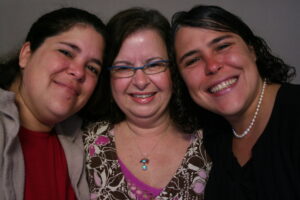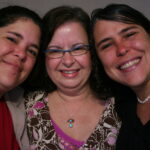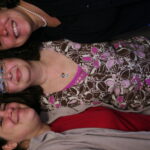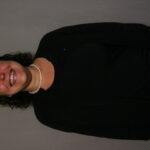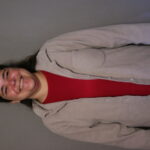Rodelin Dapena Lewis Palmer, Rosa Hadden, and Pamela Dodson
Description
Pamela Dodson, 54, interviews her friends Rodelin Dapena Lewis Palmer, 34, and Rosa Hadden, 33, about immigrating from Cuba.Subject Log / Time Code
Participants
- Rodelin Dapena Lewis Palmer
- Rosa Hadden
- Pamela Dodson
Venue / Recording Kit
Tier
Keywords
- Batista
- Castro
- Congenial Hip Disease
- Cuba
- Dual Citizenship
- family characters
- Family reunions
- Family Traditions
- first impression of America
- Havana
- Hershey Children’s Hospital
- Marial Boat Lift
- memories of growing up
- political beliefs and practices
- political prisoner
- ritual foods
- Roanoke, VA
- Scarface
- social beliefs and practices
- St. Andrew Catholic Church
Subjects
Transcript
StoryCorps uses Google Cloud Speech-to-Text and Natural Language API to provide machine-generated transcripts. Transcripts have not been checked for accuracy and may contain errors. Learn more about our FAQs through our Help Center or do not hesitate to get in touch with us if you have any questions.
00:03 Okay. Good morning. Today is October 5th 2008 and we're in Roanoke Virginia. And my name is Pamela K Dobson, and I am happy to say that I will be 54 years old this month and my relationship to the two young ladies that will be interviewing is that I met them as coworkers.
00:33 Hello, my name is Ritalin the pin of Palmer. I am 34 years old. Today is October 5th 2008. We are in Roanoke Virginia and my relationship to the people here today is when is my sister in the other ones my lovely coworker?
00:54 Hello, my name is Rosa dependa hadn't I'm 33 years old. Today is October 5th 2008. I'm in Roanoke, Virginia, and I will be interviewed with my sister and I used to work with Sam.
01:09 And I want to thank you both for coming cuz it is kind of early on a Sunday morning 9:30, but I appreciate appreciate you all doing this cuz I'm an interview and I love stories. I met you all through the law office that we've all worked at and when mostly I've worked with rodelyn cuz residents going on to another job and when we were right up the road to lean and I were working together. She's the Spanish interpreter at our office are law office as well and usually were so busy getting our work done that we didn't at first we didn't have a lot of time for chitchat and but then she started telling me a little bit about her life and I was very intrigued about it because it was so different from mine and one day she made this very interesting comment that made me think that I wanted to really know about her life and her experience because she said
02:10 Thank God my grandmother spoke Spanish when I was growing up and I thought your grandmother speaks Spanish did you know and that led into the conversation of where you came from? So why don't you tell us where you were born and start the story by the one I am ready to listen. Then the Palmer in them.
02:32 I work for two attorneys that work with p.m. And I'm from originally from Cuba. I was born there and came here in 1980 with my sister and my father and my grandmother during the mightiest boat lift. My dad had been a political prisoner and that was one of the reasons.
02:53 Why we ended up here in the United States.
03:00 Yep, this is Rosa when we came to the United States my sister she had a congenital heart disease and that's also one thing that helped us get here because during the Mariel boatlift. I mean we paid passage come here but a bunch of other people showed up to and my dad said that he had to tell them I have an invalid daughter and that's what got us on the boat. We were literally last run to get here yet because my sister was born with a congenital hip disease or one leg grew faster than the other and that she had to be put in cast so that the shorter leg to catch up with a longer one, you know what I mean? So when we got here we came through was it the keys sis?
03:48 Yeah, wherever that was. I went through Florida and we were we were flown to Indiantown Pennsylvania where there is a military base that served as a refugee camp there. And that was just for the political prisoners cuz there were also a bunch of what immigration would call Parolees that came at the same time. They were there were a lot of criminals and mentally insane people that were also sent over during that same time.
04:19 That cast roulette out of the prisons in the mental health hospitals including our uncle who was sitting over at that time in but there were a lot of good people to like Our Father who had been a political prisoner and of course Castro didn't want people like that in his country either. So he was just trying to purge The Unwanteds out even though he had an agreement with the United States, of course to send us over, you know, the good folks the political prisoners, but unfortunately when they came over and all the criminals were fighting and in Miami and all those riots, they close the doors and that our family was separated in our mother never came over. It's only about a hundred twenty five thousand people came over that just a very short time as a few months Ryan and Mario is a port city right in or around Havana Havana, so
05:19 Call me this sort of came about very abruptly that you could even never have this chance to come here. So I won't really curious about the how you found out that this was going to happen. And then how it progressed that you got to come on the boat. Well, our father had told us that they had come the night before to our house and said that we needed it all be at the clinic in the morning, which was of course a clinic but a meeting place in our town of Las Vias manakas, and so we went there in the morning and they shipped us all to the Maria's Bay, and I'm not sure how long we were there or what all went on there. But I remember that we finally were separated.
06:10 From our mother there and going on a bus and that's the last time we saw her for Monday at 11 after that. We were put on a boat from my DL to
06:23 The United States where we stood we were inside the kitchen the whole time pretty safe, but they were the boats were overloaded with all sorts of different people in since I had to I had cast on both of my legs. I got to sit down inside in the kitchen, you know, because of course I couldn't stand up and numb.
06:44 So that's how we came and that time you were six years old. Right? Right. Yes. I was 6 my sister was 5 or 10 months apart to the day now tell me about the cast that you have in your legs because you had those on from birth starting in Cuba, right or what had the treatment like my sister said I was born with a birth defect in my hips and then ended up when I started trying to learn how to walk when I was 16 months old or so, which was really late. My parents noticed that look like I was in pain and they took me to a specialist and they saw that I had a problem with my hip so they put me in these like that's a like a Puli kind of system in the crib for about six months with these levers that weight that came down and held my legs and place cuz he thought that would help but you know, of course being like two years old I was very upset.
07:44 All the time wanting to move around and it was you know, it was tough. And so they finally decide to take me to Havana which is the capital of Cuba to specialist to the other doctors in Mass when they started putting the cast on my legs to keep them still with a bar across the knee so I couldn't move my legs around and everyone every few months. They would take me up to Havana and take the cast off my legs for a week or so and then take me back to get them put back on and that went on and on until we came here when I was six to the United States of America and in Hershey Hospital in Pennsylvania. God bless them and my sister who helped me a lot and I learned, you know how to walk finally until you're not until you're six years old. Did you learn how to walk on your own Yes, Man Rosa tell us about this how red one would get a
08:44 Around when she had the cast on her legs. I think you have a good story about that. That's funny. I was funny cuz I wanted to mention something about that. She may have been in cast but she could move.
08:56 I would try to copy her cuz she had to drag herself around on the floor bless her heart on her butt, but she could do it really fast because like you don't, you know across the house and I try to do it too and I'm like like and why don't you develop some other way in some other way of trying to fire you take me around and stuff. He had a little wagon and Bobby would drag us he would pull us but your dad found you in the wagon. I mean the wagon was for her, but I'd pitch a fit if I didn't get put in it to you know, so we got pulled into a my sister would send me to do stuff to that's how she got things done to I was like her assistant or something. She don't have a lot of really codependents growing up live solutely. We're very close but you have another sister that stayed in Cuba right an older sister, so she didn't come and tell us the reason why that happened.
09:56 The reason why that happened is because we call her kolke but her name is Will. He's she is our half sister or mom was married previously before she met our dad and they had us and our sister cookies father with Communists. And at the time he was fighting in Angola remembering and goal of a split between the Communists and the anti-communist welding Cubans were helped in the Communist obviously and we had to get permission from him to let go if you come and by the time we got permission it was too late in the mighty Waters that close. Yeah. So it was so your mother stayed behind with your older sister and the main reason that your father let your let you are you rather your mother let the two of you come with your father is because she thought she would be coming soon afterwards. I mean she would have course, you know any
10:56 Father would not let their children leave unless they thought they would be reunited at some point have a plan was just to wait until she could get sperm in your other sister, but also your grandmother came, which is your father's mother and she really then became your mother figure here in the United States, right? Yes. She definitely maintain the Cuban values in the house the whole time we grew up. She always Cooks Cuban food. I mean, we always spoke Spanish a foreign antigen the household culture at home was keeping culture in at home. We were Cuban and you know outside in the world at Roanoke Catholic and other places. We were Americans, so it was really a split and it was not easy at times did, you know cope with the differences and cope with not having our mother here with us and
11:50 But yeah, that's totally traumatized is Mos in different way now, cuz when I was in Cuba, I was a little Spitfire. I was a what you would call a brat major brat. I was the bully in kindergarten class and I was a little loose one, you know, cuz I thought the world was mine and I ran it kind of thing and I got here and everything was different and I kept wondering where Mommy was where's mama? Cry everyday of her mother when we first came four years. Yeah. I cry all the time. I spent my whole childhood depresses. She did and my sister she she's like tougher than I already said her babyhood suffering, you know, your hips and stuff that definitely if I told her life and she always had mommy they are to take care of her. So when she got here she was like she didn't respond to it the same way. I did she got more more than that hard in a bit more more independent. Maybe a little angrier. I think made it tougher.
12:50 So we handled it differently and she'd get impatient with me cuz I wasn't handling it the same way she was and and plus you have to remember that. You know, my childhood wasn't the same as other children's childhoods because I didn't move around I didn't get to play with other kids. I didn't get to do things other kids. Did you know I sat there pretty much my whole childhood and Cuba on a rocking chair rocking looking out the window and watching the kids play and stuff. So I wasn't, you know, I was pretty mature in a sense, you know, when I was small than other kids United because I didn't have like the freedom that you know, just even walking around
13:33 You know where that had a wheelchair so, you know anyting it would have given me the freedoms that you know, she had pretty sure that your treatment for your birth defect. Do you would have gotten completely different treatment in Cuba if you'd stayed there to eat. Do you think you contribute our attributes coming to the United States to your being able to be mean it looking at you now? You cannot even tell you where ever had a problem I'll absolutely I mean when I was little and Cubed they did try it one point to see if I could like staying up on crutches and stuff and I could not but they didn't ever try any rehab or any further treatment past the always putting that those cast on my legs and when I arrived in the United States, and they took us to Indiantown Pennsylvania, and after that they sent me and my father over to Hershey's Children's Hospital in Hershey, Pennsylvania.
14:29 They said that they couldn't believe they died this cast on my legs all those years and I mean they were just shocked about you know, how they had treated my problem and stuff and in 50 mean I really helped me a lot and put me through rehab and my sister she helped me a lot when I got back to Indiantown. How is her physical therapist to utilize it is carried on with you at the hospital.
14:59 You know, I was her partner in crime. So you spend some time they are. Do you know how long you were in Pennsylvania few months 6 months with no it was maybe a couple of months then. How did you get to the to come to Roanoke? You were sponsored right by Church?
15:21 And it was course the second time we've been on a plane and we came down here and everybody from St. Andrews was there at the airport to meet us a lot of Cubans and I mean there weren't that many here at that time like there are today but it felt welcome. Oh we were very welcomed and we got to live in the old Convent we first month which is now laying down but we that was a very neat experience and my sister and I would explore through all the different levels of it. There were even a couple nuns you live there still then so our speak their speaking of a church of the Catholic Church, which is very near to where we are right now. And then you were able to go to Catholic school because your father they gave him a job at the church. He worked there for 16 years as their Gardener and Cuba. He'd been a an agricultural engineer scientist kind of a botanist. I would I guess I would say
16:21 And so and we moved over to Grand and Village Apartments. I don't think that's what they were called in but the apartment they set us up in an apartment over there and set us up with going to run a Catholic and more in the first year we went to wasena and so but after that he got us in the school. I'm still curious a little bit about that short notice that you had about that. They came to your house one day and said be at the clinic tomorrow and then you can come to America now and most families just to make a decision overnight would be unbelievable to do you remember what happened that night that particular night when the decision had to be made if you were going to go or not go. Our mother went with us to my DL. I mean she went with us all the way out there.
17:21 Yeah, there weren't any decisions. I don't think made that night. We were very small so we wouldn't even know about that. But I think what is important understand is that my dad was a political prisoner for nine years and that's the reason that we came during the Mighty Eighth boat left. I know a lot of people have seen the movie Scarface and see the ugly side of the material which that movies centered around that time and supposedly, you know, he was a Cuban Criminal Who had come over during that time and so people are only show on the bad side of the Mariel boatlift. And so that's real important understand and I think my sister I'd like her to explain really why my dad was a
18:07 Political prisoner and how all that came about which means Daddy in Spanish? That's what we call him in our son's call him Papi to he's everybody's Poppy.
18:21 Poppy was an anti-revolutionary counter-revolutionary person, you know during the time that Castro was having his Revolution and and instigating his government there was an anti-revolutionary movement because like a civil war going on in queue up the handle it more like a gorilla or fairy away. It was more.
18:44 Like secret attacks this and that and whatever but my dad was a big part of that and he had four people.
18:58 Communist plans and I don't know how much information you would want me to give about that. But let's say he did a lot of things a communist didn't like so they put him in prison for 9 years. Yes, but why was the anti-communist anti has our family lost everything? I mean the same with Communism is nobody there is no difference between the rich and the poor and everybody has the same amount of everything. You know what I mean, but what ends up happening really is that nobody has anything and that for the government cuz they don't eat very greedy. This is what happened is during Bautista. This is what all happened how it came to be paid by these still was the government before Castro and his government was quite corrupt in the sense that you know, the rich were very rich and the poor were very poor. There wasn't a lot of education for those who couldn't afford it and things like that. So the poor people were
19:58 Very upset with this and Castro came along saying well I am here for you guys. I'm here to better your lives. So that these rich people can't just keep living a great life while you're suffering. So that's how he got support from the Cuban populist. Well when it turns out that he comes into Power he is a very greedy man and he doesn't come through with all his promises he goes through and takes the land and the money of many many people and takes all our riches away. And yes, he did give education to the poor and maybe gave them medical attention that they didn't get before.
20:43 Batista's government, but at the same time people lost all their freedoms of speech their freedoms of Liberty their their property and everything like this and young man, like my father were in raged that all of a sudden they had grown up having a nice life and being well-educated and just living the life of a nice young man and all of a sudden his future and his inheritance is all gone. The government has taken it all and they're down to nothing and they're really upset and these young men and women are quite upset with the Castro regime for coming in and doing this to them. So they do whatever they can to hurt the Castro regime for their Liberties for their freedoms for their property. They felt they were fighting for their livelihood. Absolutely for what they were for everything they sting.
21:43 Fork and you know and they're good things and bad things between the two forms of government. But you know, they're both very bad and you known Castro like if did Communism if it were true communism, it would have been perfect because everyone would have had plenty of food. Everyone would have had nice stuff, but that's not how it worked out and even till today they still have the rich Communists in the poor people in the public that have nothing and that wait for rations for meat for they can't even have lobster and I mean and it's opening up some now if I was when my sister and I went there 5 years ago,
22:25 Our family wouldn't have been able to go up to the hotel room with us. Now. Castro has opened that he has opened up a lot of things and hopefully it'll only get better for you know our people there. But yeah, that's the reason I've met your dad and he seems like a very humble man. He's how old is he now? 64 64 65 in folks that don't don't know this this boat lift happened in 1980. So some time pass before you ever were able to go back and that was five years ago that you just referred to and that was so how many years have passed since you had seen your mother 23. So you went 23 years and you didn't weren't able to see your mother or your sister. I mean, we have no one here.
23:22 The majority of our family is all in Cuba and Monica's but you just found out recently that someone else from your family has come here. It was that are nice or else I'll just arrived in the United States. Where does she live now? She lives down in Miami. We haven't even gotten to see her yet. I mean, she just arrived in the last couple of days. So it's glorious new and thank God for that. We found out from our brother-in-law and we're very very excited. I can't wait to talk to her later today. We're cuz we have to plan our calls and stuff is like very new news to us because we didn't think we'd see anybody from there over here ever ever when we went from here.
24:12 To go to Cuba how many people were related to us and loved us? Yeah, and they all remembered us. And so when you go what is your favorite place to go in the United States where you really feel at Home Hialeah wheel of Miami to South Beach. Is there an area? They're called Little Havana Hialeah live like it has lots and lots Cubans. There's a great place to go. You see all the Cuban food or granny used to make and Ambience and men that look like our father playing dominoes and smoking cigars and as we talk loud and people think we're arguing but we're just very vociferous and impassioned when were speaking for not necessarily arguing just stating your opinion and strong Larry imperative meaning
25:12 Well, what are the Traditions that you have been able to keep in your family that make you stay connected to your Cuban Heritage. I tried to kick some Cuban food sometimes but it's never like my mind ever ever ever. So what what kinds of Cuban foods give us the names and maybe what scent degree of the ingredients or something anybody can do that but black beans sometimes mixed together, Idaho Police keeping states are cubed steaks you got which is cassava in English and it comes to the lights nice lemony garlic sauce, which is divine and and Granny always like to serve, you know cucumbers event tomorrow at different flan flan is really good. We eat beans in the Cuban household. You will eat beans and rice just about every day might be different kinds of beans but always at White
26:12 Always white right away with some sort of beans and they're always season with cumin and garlic and paprika and pepper. And and how did your father to how did he keep the your heritage in your grandmother? How did they keep it alive? Besides the food with Mike. Did they play music where you lie, and you came here. How did he identify and talk to you about that and explain to you what you know what your heritage was about a puppy is a master Storyteller. Really? Yeah one day. I'm going to write a book on him. He's a great Storyteller. We learned a lot that way in a lot of things that Granny did the way she taught us about different things and he used to play Cuban music all the time and it's like my sister said easy was a Storyteller. He still is to this day. He continues to tell us stories about Cuba and his childhood in life. And so we are just continuously, you know, always
27:12 Learning about new things about his childhood and Cuban stuff. We will never forget who we are and where we come from even though we are just so proud to be Americans and to have the opportunity to have such a good life here and have the freedoms that when we went to Cuba few years ago being brought up by my dad who was very outspoken for freedom and rights to go there and to see people who couldn't say what they wanted to say because they were afraid to go to prison, you know, just broke my heart and my sister's heart because we have always been very outspoken in our beliefs for people's rights and and our freedom of speech which we hold so dear here in the United States, you know, is those little things that those children and Cuba don't even know what that means, you know.
28:08 Without being afraid of getting taken away and it's just something that people I want people here in the United States to understand how lucky they are to have so many freaking thing. Yes. We have big brother who maybe we have video cameras everywhere and stuff like that. But you know what, they're keeping us safe and they're not sitting here. They're not doing it to hurt us. Like it would be there. It would be there if there were videotaped it would be spying on you to see are you talking bad about the government or whatever, you know here is you know, they're looking out for us for our safety, you know, any differences like that that people just don't understand I mean
28:57 Yeah, we really when we went to Cuba. It was it was a very tremendous trip that your son's not both of you have sons right or your son's able to go when you went to Cuba. We don't want to take them just in case they close the borders and didn't let us out cuz they did do that last couple weeks after we left. We are considering we have dual citizenship. The Cubans don't recognize our American citizenship. And of course the Americans don't recognize our Cuban citizenship, but we still have to get two passports to go there with the Cuban passport and the American passport, which is interesting. So we really had to be careful. It wouldn't be like you if you went on a trip with the state department and being an American you would be safe if my sister and I go there we're being were considered Cuban.
29:52 Nationals and we have to really, you know, watch what we're doing and stuff. So that's why we didn't take our children, but you both have Boys sons. Tell me a little bit about your son's.
30:05 I have my little boy's name is Tavia and his father is Cuban too. And so I would have been afraid to take him to you because he's considered a Cuban citizen to cuz he's got Cuban parents so that they can we both have been trapped but he's 11 years old and he's little handsome sweet thing and he's definitely are a little Cuban.
30:30 Rico Suave girls yet. And then your son riddle in is mine is Drew and he's 12 13. Actually, he just turned 13 not too long ago and is begging to Guitar Hero III. Yes. He's very tall and handsome. He looks like my little American boy, but he's have Cuban and we're both very proud of our boys are like brothers since we don't have any other kids they have
31:05 Stick together they feel a close connection Weekend Cousins, but it's more like brothers and they spend a lot of time with your dad or dad makes them feel like they're really special to our dad loves the boys their his sons. As far as he's concerned son's he never had he got stuck with two girls. So yeah, we gave him two sons. Yeah. Well, we we've covered a lot of what your life was about. What do you want folks to know right now at this time in our country when the elections coming up and immigration obviously isn't issue. What what each of you would you like to make sort of a statement about why you think it is important that the United States
31:52 Act on this issue and what do you think that that the attitude should be of the American citizens towards folks who want to come here? I got a strong opinion about that. I Rosa I think that people should remember that this is a country of immigrants. The only piano outfits to begin with the immigrants are what made this country great. You know, you just has to go back a while as well. See where it all started his people forget their history cuz there have been many massive immigration influxes here, you know. So this most recent influx. Everybody says surprise. Oh my gosh is immigrants. You know what I mean? There's always been immigrants here now and I and I think immigrants at a lot of diversity and diversity.
32:47 Creates ideas, you know and and zero Horizon expands your horizons make sure light on or interesting should be honored not we can learn a lot from each other and I feel too at this time. What I want people to know is that it we are so lucky to be in the United States of America. Everyone keeps complaining all the time about different things that are going on. But just remember that we live in the land that is so great and full of opportunity. Sometimes you have to look for your opportunities and it may not be right at your doorstep, but we are so lucky. We have the freedom of speech freedom to vote for whoever we want and different parties and I just want everyone, you know to use that freedom and vote and be true Americans and stand up for what they believe in and that's not what I believe.
33:43 Well, I appreciate you all sharing your story and I'd like to just share a little bit of mine at the end here to I'm an immigrant as well. It turns out that a lot of my Heritage is Native American but my 14th generation grandfather came over on the Susan Constant ship in 1607 from Leeds England. So, you know, even though my family's been here longer it's still they went through a hardship and came over on a boat and now and then he met the daughter of a chief Eagle plume and Mary Jane Eagle plume. So America really is Young still and it is all about the diversity and I agree with you and I want to thank you both for letting me interview you and coming and doing this. It means a lot to me as well to hear your story, but I appreciate it very much. We want to thank you p.m. For
34:43 Inviting us cuz it means a lot to us to think that someone really cares about her story, and we appreciate you care a lot about it. Glad I meant both of you. Thank you. Thank you.
